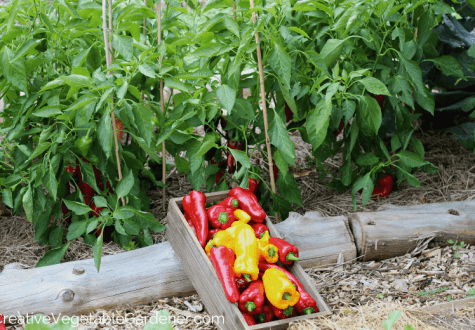Organic Vs. Synthetic Fertilizers: Which Is Best for Supporting Healthy And Balanced Pepper Plants?
In the world of supporting healthy and balanced pepper plants, the choice in between synthetic and organic plant foods stands as a critical decision with significant effects. While both choices purpose to supply essential nutrients to sustain plant development, the subtleties of their influence on the dirt, plant wellness, and the atmosphere stimulate a discussion that mirrors throughout the gardening area. Understanding the unique benefits and possible risks of each fertilizer type is important for pepper farmers seeking to enhance their returns while keeping a sustainable and eco-conscious approach.
Advantages of Organic Plant Foods
Organic fertilizers offer a sustainable and environmentally-friendly approach to beneficial pepper plants, offering crucial nutrients without using synthetic chemicals. These all-natural fertilizers are originated from natural resources such as garden compost, manure, bone dish, and algae, advertising dirt health and biodiversity. Unlike artificial fertilizers, natural options release nutrients slowly, guaranteeing a balanced and consistent supply for pepper plants to grow.
One considerable advantage of natural fertilizers is their ability to boost dirt structure and water retention. By enhancing dirt health and wellness, organic plant foods promote advantageous microbial task, which aids in nutrient uptake by pepper plants. In addition, organic plant foods reduce the danger of chemical run-off, safeguarding water resources from contamination and safeguarding the atmosphere.
In addition, organic plant foods add to long-lasting soil fertility by promoting the development of useful soil organisms. These microorganisms assist damage down raw material, launching nutrients in a type that is conveniently accessible to pepper plants. best fertilizers for peppers. By fostering a healthy dirt environment, organic plant foods support lasting pepper growing practices that benefit both plants and the setting
Downsides of Artificial Fertilizers
Artificial fertilizers, in contrast to their organic counterparts, posture different disadvantages when made use of to nourish pepper plants, influencing both plant health and wellness and environmental sustainability. One significant disadvantage of artificial fertilizers is their propensity to leach nutrients from the soil quickly. This fast leaching can bring about vitamins and mineral discrepancies in the dirt, triggering plants to struggle with poisonings or shortages. Furthermore, artificial plant foods can harm helpful dirt organisms, such as earthworms and helpful germs, interfering with the dirt ecological community's equilibrium.
In addition, the overuse of artificial fertilizers can add to water pollution. Excess fertilizers not soaked up by plants can get rid of right into water bodies, leading to eutrophication, where algae blossoms diminish oxygen levels in the water, damaging marine life. Additionally, artificial plant foods are normally derived from non-renewable resources, such as fossil gas, adding to carbon exhausts and ecological deterioration throughout their production.
Nutrient Absorption Comparison
Effective nutrient absorption plays an essential duty in the general health and growth of pepper plants. When comparing natural and artificial fertilizers in terms of nutrient absorption, organic fertilizers have the benefit of offering an extra well balanced and slow-release source of nutrients (best fertilizers for peppers). Organic fertilizers contain a variety of macro and micronutrients that are not only valuable for the plants yet also advertise healthy and balanced dirt microbial task, which helps in nutrient uptake. On the other hand, artificial fertilizers often provide a quick launch of nutrients, which can result in seeping and runoff, resulting in reduced nutrient absorption prices by the plants.
Additionally, natural plant foods enhance soil framework and water retention capability, allowing pepper plants to accessibility nutrients a lot more successfully. This improved soil quality helps with root growth, making it possible for much better nutrient absorption. Artificial plant foods, although originally increasing plant growth due to their high nutrient concentrations, may hinder long-term nutrient absorption by derogatory soil health and wellness gradually.
Ecological Impact Factors To Consider

On the other hand, artificial plant foods, although usually more quickly available and focused to plants, can have destructive effects on the atmosphere if not applied appropriately (best fertilizers for peppers). Their production calls for high energy inputs, leading to greenhouse gas emissions and contributing to climate adjustment. The overflow of excess artificial fertilizers can infect water sources, leading to eutrophication and hurting marine communities.
Ideal Fertilizer Practices for Peppers
To achieve this, it is important to follow ideal fertilizer practices customized to the details requirements of pepper plants. One critical technique is to do a soil examination before using any kind of plant foods.
Another crucial method is to fertilize pepper plants at the right time. Normally, peppers take advantage of receiving fertilizer at planting and then again when they begin to flower. Over-fertilizing can result in nutrient inequalities and hurt the see this here plants, so it is vital to adhere to recommended application prices.
Additionally, selecting a balanced plant food with an NPK proportion that fits pepper plants' demands is basic. Organic fertilizers, such as compost or manure, can be exceptional choices as they release nutrients slowly and boost soil structure with time. Nevertheless, synthetic plant foods can give a quick nutrient boost when needed. Eventually, integrating synthetic and natural fertilizers deliberately can assist support healthy pepper plants while minimizing ecological impact.
Final Thought

Organic plant foods offer a sustainable and environmentally-friendly approach to nourishing pepper plants, giving important nutrients without the usage of synthetic chemicals. Unlike synthetic plant foods, natural options release nutrients gradually, making certain a well balanced and steady supply for pepper plants to flourish.
Artificial plant foods, in comparison to their natural counterparts, posture various drawbacks when utilized to nurture pepper plants, influencing both plant health and environmental sustainability. When comparing artificial and natural plant foods in terms of nutrient absorption, natural plant foods have check it out the benefit of providing a more balanced and slow-release resource of nutrients.In addition, natural plant foods boost dirt framework and water retention ability, allowing pepper plants to access nutrients more efficiently.